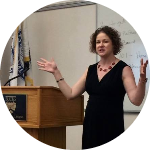Design Your Online Sociology Course with Connect® Based on the Quality in Online Learning Certification
We interviewed Bucks County Community College instructor, Erin Cole, about best practices for planning your course with Connect and your Quality in Online Learning Certification.

We interviewed Bucks County Community College instructor, Erin Cole, about best practices for planning your course with Connect and your Quality in Online Learning Certification.
How would you recommend a new faculty member get started?
“I recommend new faculty members create a facilitation strategy or checklist of what they need to do before, during, and after the course. This checklist is useful in considering things like, ‘‘What are the most essential things students need to take away from the course, and how can those best be achieved?’ And ‘How do you want to organize the course (units, learning modules, chapters, etc.)? Pick a strategy and structure to follow.’ It also helps faculty stay on track while both preparing for and teaching the course.
One feature of McGraw Hill Connect I find particularly useful is the ability to link assignments across multiple sections that I teach. You can make changes in one assignment and the changes will be reflected in each section. Another feature I find useful is the ability to share assignments directly with other faculty.”
What are some of the standards you need to keep in mind?
“I think it is important to begin with the end in mind. Using the backward design process is useful to make sure that the assignments are designed for students to achieve the course learning goals. For example, one of the course learning objectives in my Intro to Sociology course is for students to " ‘demonstrate the ability to read critically, analyze, and interpret information and construct logical, well-supported positions on current social and political issues."' The Power of Process assignments directly align with this goal.
The OSCQR Rubric provided as a resource in the Online Learning Consortium (OLC) is extremely useful in allowing you to design and evaluate your course based on established standards in multiple areas.”
What specific Connect tools would you recommend using?
“The assignments I find most useful in helping students develop their sociological imagination are the ‘In Their Shoes’ assignments, because these assignments emphasize how you can view social issues from a different perspective.
The Power of Process assignments are also useful in helping students think critically while reading articles. I really like that students can highlight and annotate sections of the article and then return to summarize and analyze what they just read.”
What assets or strategies do you find most effective for engaging students in the core text/course content students need to know in an online environment, and how do you recommend deploying them?
“I am always striving for students to use their sociological imagination and relate the core concepts presented in the text to their own lives and , experiences, and also current events. I achieve this through a series of reflection assignments and discussion boards. For example, after reading about interdependence, students are then asked to list 10 people that make it possible for them to attend college. They are then asked to relate this list back to what they just read about interdependence. Detailed and personal feedback is also key to helping students make these connections. Through discussion boards, students are asked to share their own experiences and also are able to see how other students in the course have different ideas and perspectives about the same concepts.”


